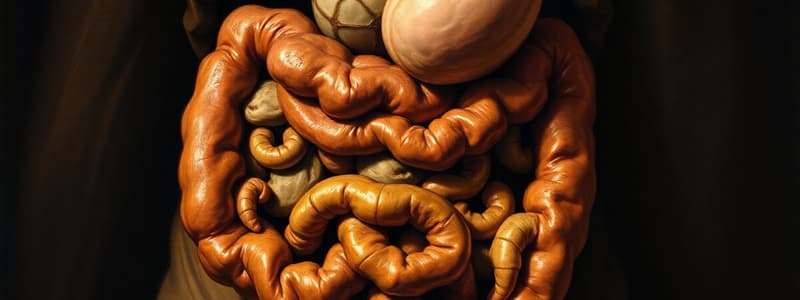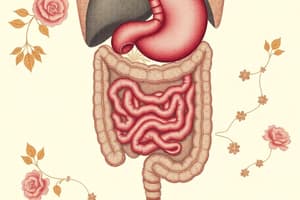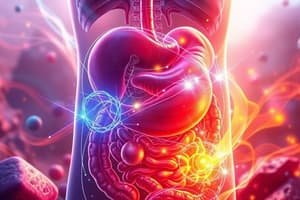Podcast
Questions and Answers
What is the primary role of the pancreas in digestion?
What is the primary role of the pancreas in digestion?
Which layer of the digestive tract contains the lamina propria?
Which layer of the digestive tract contains the lamina propria?
During which phase of gastric secretion does the vagus nerve increase action potentials to the stomach?
During which phase of gastric secretion does the vagus nerve increase action potentials to the stomach?
What type of hormone is stimulated by the presence of fatty foods?
What type of hormone is stimulated by the presence of fatty foods?
Signup and view all the answers
What is the main site for nutrient absorption in the digestive system?
What is the main site for nutrient absorption in the digestive system?
Signup and view all the answers
Which cells are responsible for secreting pepsinogen in the stomach?
Which cells are responsible for secreting pepsinogen in the stomach?
Signup and view all the answers
What is the process called that involves powerful contractions occurring in the colon a few times each day?
What is the process called that involves powerful contractions occurring in the colon a few times each day?
Signup and view all the answers
What is the significant role of mucus in the digestive system?
What is the significant role of mucus in the digestive system?
Signup and view all the answers
What is the correct sequence of layers from the lumen to the outer wall of the digestive tract?
What is the correct sequence of layers from the lumen to the outer wall of the digestive tract?
Signup and view all the answers
Which enzyme is responsible for digesting proteins into peptides?
Which enzyme is responsible for digesting proteins into peptides?
Signup and view all the answers
What is the primary role of bicarbonate secretion in the digestive process?
What is the primary role of bicarbonate secretion in the digestive process?
Signup and view all the answers
Which sequence correctly describes the steps of fat digestion and absorption?
Which sequence correctly describes the steps of fat digestion and absorption?
Signup and view all the answers
What would be the effect of decreased levels of bile salts in the bile?
What would be the effect of decreased levels of bile salts in the bile?
Signup and view all the answers
During defecation, what is activated by stretch receptors in the rectal wall?
During defecation, what is activated by stretch receptors in the rectal wall?
Signup and view all the answers
What is the consequence of a blockage in the ducts from the parotid glands?
What is the consequence of a blockage in the ducts from the parotid glands?
Signup and view all the answers
What triggers the rise in blood levels of secretin in response to acidic chyme?
What triggers the rise in blood levels of secretin in response to acidic chyme?
Signup and view all the answers
What happens in response to the hormone cholecystokinin?
What happens in response to the hormone cholecystokinin?
Signup and view all the answers
What primarily causes diarrhea during intestinal infections?
What primarily causes diarrhea during intestinal infections?
Signup and view all the answers
What is the effect of blocking carbonic anhydrase in parietal cells?
What is the effect of blocking carbonic anhydrase in parietal cells?
Signup and view all the answers
How many lymphocytes are estimated to be present in the small intestine?
How many lymphocytes are estimated to be present in the small intestine?
Signup and view all the answers
Study Notes
Digestive System: Key Concepts
-
Mechanical Digestion: Involves chewing, churning, and segmentation to physically break down food.
-
Chemical Digestion: Enzymatic breakdown of food into absorbable units.
-
Accessory Organ of Digestion: The pancreas.
-
Large Intestine Absorption: Primarily absorbs water and electrolytes, not nutrients.
-
Digestive Tract Layers (Lumen to Outer Wall): Mucosa, submucosa, muscularis externa, serosa.
-
Mucosa Components: Lamina propria and mucous epithelium.
-
Lamina Propria: Loose connective tissue beneath the digestive epithelium.
-
Chief Cells: Secrete pepsinogen.
-
G Cells: Secrete gastrin in the stomach.
-
Intestinal Epithelial Cell Junctions: Leaky junctions in the intestines.
-
Mesenteries: Double sheets of peritoneal membrane holding visceral organs.
-
Slow Waves: Spontaneous cycles of depolarization and repolarization.
-
Interstitial Cells of Cajal (ICC): Pacemakers for slow wave activity.
-
Mass Movements: Powerful colon contractions (a few times daily).
-
Swallowing Center: Located in the medulla oblongata.
-
Mucus Function: Protection and lubrication.
-
HCl Secretion: Parietal cells in the stomach.
-
HCO3- Secretion: Primarily from the pancreas.
-
Primary Nutrient Absorption Site: Small intestine.
-
Amylase Source: Salivary glands (for mouth) and pancreas (for intestine).
-
Dietary Fat Form: Primarily triglycerides.
-
Bile Secretion: Hepatocytes only.
-
Large Intestine Functions: Water resorption and feces compaction.
-
GI Tract Hormone Stimulus: Hormone release stimulated by specific foods/substances.
-
Incorrectly Paired Hormone & Stimulus: (From provided list) Motilin – acid in the small intestine.
-
CCK Stimulus: Fatty foods.
-
Gastrin Stimulus: Peptides, increased sympathetic activity.
-
Secretion Stimulus: Acid in the small intestine.
-
GIP Stimulus: Glucose in the small intestine.
-
Cephalic Phase: Increased vagus nerve activity to the stomach.
-
Gastric Phase Trigger: Food entry into the stomach.
-
Protein Digesting Enzyme: Trypsin.
-
GI Muscle Contraction Characteristics: Phasic contractions are short-lived and occur in the stomach and small intestine.
-
Bicarbonate Secretion Role: Neutralizes stomach acid entering the duodenum. (Apical CL-HCO3- antiport mechanism).
-
Saliva pH: Slightly acidic (6-7). Controlled by autonomic nervous system.
-
Fat Digestion & Absorption Steps (Order):
-
Bile salts coat fat droplets
-
Pancreatic lipase & colipase break down fats
-
Monoglycerides & fatty acids move out of micelles
-
Cholesterol is transported into cells
-
Chylomicrons are formed
-
Chylomicrons are released into lymphatic system
-
Defecation Reflex: Stretch receptors in rectal wall activate parasympathetic centers.
-
Bile Salt Deficiency Effect: Interferes with fat digestion.
-
Secretin Release Trigger: Arrival of acidic chyme in the duodenum.
-
Parotid Gland Blockage Effect: Interferes with carbohydrate digestion.
-
Cholecystokinin Effect: Stimulates pancreas to secrete enzyme-rich fluid.
-
Carbohydrate Digestion Product: Primarily glucose and galactose (from lactose).
-
Diarrhea & Intestinal Infections: Bacterial toxins increase KCl secretion, leading to water movement into the intestine.
-
Carbonic Anhydrase Blocker Effect: Higher pH during gastric digestion.
-
Cholecystokinin Blocker Effect: Affects pancreatic secretions.
-
Lymphocyte Location: 80% found in the small intestine.
Studying That Suits You
Use AI to generate personalized quizzes and flashcards to suit your learning preferences.
Description
Test your knowledge of the digestive system with this quiz covering essential concepts such as mechanical and chemical digestion, the role of accessory organs, and the layers of the digestive tract. Discover the functions of various cells and structures involved in digestion.




